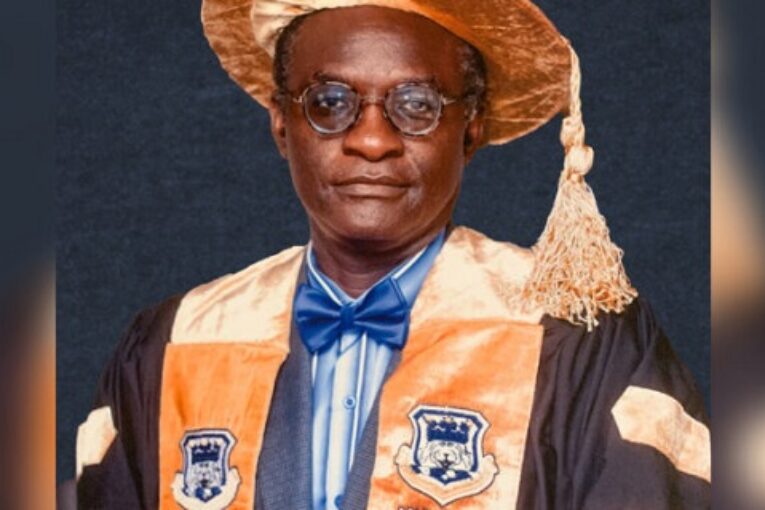
Professor Abel Olorunnisola, an expert in Agricultural and Wood Products Engineering, is the second vice chancellor of Dominion University, Ibadan, founded four years ago by the Victory international Church, Oluyole, Ibadan. In this interview, he speaks to MODUPE GEORGE about his appointment, achievements in office, among other educational issues.
How has it been charting the course of a budding university?
I joined the institution some two years ago and it has been interesting serving in this capacity. It’s all about pioneering but we thank God that the university has been growing in leaps and bounds. When I came in 2021 we had a students’ population of about 300. Today we are approaching 700. That means within the two years we’re more than double, and that is a most critical thing for university in terms of population. The next most important thing is infrastructure, which takes care of the population that we are growing. Also, since I came in, there have been two new hostels built and another one is under construction, while the hospital complex has been built and I can say that in terms of infrastructure development, we have made tremendous progress.
Another critical thing about a university is its staffing. We have the students, the infrastructure, what about the staff? When I came onboard, the staff strength was just 20 but today we have about 80. Looking at all the indices for judging a growing university of just four-year old, we have made tangible progress. In terms of visibility, we have also been able to establish a presence even in Europe. This year, three of our students and two members of staff travelled to Greece as a result of a staff/student exchange programme. The students spent a whole semester, while the staff spent just one week. When it comes to diversity in staff and students population, we are not doing badly. We had our first graduation some few weeks ago, where we graduated 92 students. Before we had them from about 19 states of the nation but currently, we have students from about 23 states of the federation, aside from the ones from Lebanon, Ghana, Sierra Leone, among others. Also, in terms of our staff diversity too, they came from all across Nigeria: from Benue, Delta, Edo, among others; we don’t discriminate in terms of gender and racial background.
With your experience in the intricacies surrounding leading a university, do you think there is justification for proliferation of private universities in the country?
Former president, Goodluck Jonathan, in a single year established nine brand new federal universities. Buhari in his time established not fewer than five or six, while quite a number of private universities have been licensed. What the government has been emphasising is the issue of giving access to more Nigerians to be able to enjoy tertiary education. All I can say is that if we have exceeded the number that we need each university will find its own level, those that will survive will survive. Interestingly, many of our private universities are thriving and certainly there are few that are struggling though; just like there are public universities that are struggling. One good thing that I have seen is that the National Universities Commission is still performing its functions. It goes for accreditations consistently and any institution that is found below standards may be denied accreditation. There are big universities that lost their accreditation in the past. So, if that process continues, I’m sure we will be fine. Also, the NUC has approved that private universities can be sold; that is, if a proprietor observes that he no longer has the capacity to continue to run his/her university, be it financially or administratively, foreigners are allowed to take over the institution. For instance, there is a particular private university in Abuja that has been bought and it’s thriving today. The issue of ownership has been democratised.
The joy of every VC is to have all of his institution’s programmes accredited. How many of your programmes have been accredited by the NUC?
Basically, we have 11 programmes and all of them have been accredited. Industrial Relations and Personnel Management were initially approved but they were stepped down some three years ago due to low subscription. Currently we have two faculties which we intend to unbundle as the population grows.
Every institution has its strength. What is that uniqueness that will make people choose DU over other institutions?
The general unique selling point for private universities is the uninterrupted academic calender. So, the key one for us in DU is combining godliness with excellence. Here we say that we are raising generational leaders and what we do is that we go beyond the call of duties to teach our students marketable and entrepreneur skills and we instill godliness in them. We have started receiving feedback through those of them who went on industrial attachment. For instance, we have a dress code. As a student of this institution, you must be properly dressed. Here we prepare them to be leaders and when they go out, they stand out. When it comes to knowledge, especially in these days of ICT, we equip and lay emphasis on things that will stand them in the world of info-tech, coupled with godliness and character. We don’t condone indiscipline here; if you violate some specific rules, you will be sanctioned.
Most importantly, we’re not a private university that dashes out certificates. You must earn your degree; they are worked for. We have been able to attract very smart students. Though I was not there when they came in, having looked at the records, they justified it. When the university started in 2019, the person with the highest score in Unified Tertiary Matriculation Examination the had 291, which was quite high, and still graduated with a First Class. This was because he was consistent with his academic excellence. Quite a number of those in the first set also scored 250 and above in UTME and they also graduated with First Class. That is to confirm that the JAMB score and the final grades are not at variance.
How many of them graduated first class at the maiden convocation?
Out of 96, we got 21 First Class and nine of them were from the Mass Communication Department, one from the Business Administration Department, two from Biochemistry, two from Computer Science, two from Cyber Security, four from Micro Biology and one From Software Engineering.
To what extent would you say that your graduates have the capacity to engage in private practice rather than seeking white collar jobs upon graduation?
We have provided ample opportunity for our students to have a foretaste of what entrepreneurship and even job experience is all about. For example, we have a work-study programme for them; as a student, you may work for the university, such as helping in the library with cataloging or assisting at the cafeteria within the space of just one hour. What does that do for you? It helps you to understand work ethics, because we will discipline you when you don’t do what you are supposed to do. It also helps you to know how to work for money or probably to augment what your parents are giving you. It exposes you to the world of work, in terms of what to expect when you graduate. What the university is doing is all about exposing them to the basics because they may not necessarily work in the area of their study. Another thing we also encourage them to do is volunteering to do a number of things on campus, such as serving as ushers when we’re having programmes, some even volunteer to join the university cafeteria to cook noodles in the way their fellow students love it to be prepared, among other things that prepare them for the outside world.
The wellbeing of the Nigerian education system has always been questioned and you being a stakeholder, if you have the ears of the government what would you say is really the bane of the education sector.
The fundamental issue with the government is that we are not giving enough priority to education. There is a UNESCO document that specifies the percentage of the annual budget of the government that should go to education; it’s about 17 percent. I’m not sure if the Nigerian government has even reached seven percent and then when the government says that it is funding universities and they quote the bill of what they have spent, most of the funding goes into buildings and other things. Moreover, the government is not investing enough in manpower at the university system level, which has to do with human capital development. Considering what obtains in other climes, the fact they have given me an office or the classroom to teach is not all that I need as a lecturer. Am I not supposed to go to conferences to interact with my colleagues? Am I not supposed to publish in the best of journals? Are my laboratories not supposed to be well equipped? Nowadays, most public universities now go to private ones to carry out their research. These are some of the issues we are having in public universities in this nation. Unfortunately, it is still this same government that will be handing what you call ‘an envelope’ to universities to run their systems. When they go with the budget of 10 million, the government will give them an envelope of 4million and say “please go and do what you can with it.” These are just envelopes to public universities; the government is not really addressing the budget, it is just saying this is what I have. What the government has just been doing for more than 50 years is just handing envelopes to institutions. It is this same government that will say we should not charge tuition. So, the best thing is for us to sit together and look at what the issues really are and what are the best possible ways to resolve them. With my working experience in the public university system which is going to 31 years now, I know what I am talking about. I have worked in UI continuously from 1993, I have not gone to any other university. I know areas of wastages that can be blocked and even the wastages that are created by the government itself.
What do you mean by wastage?
For instance, the government will come and say they are giving you as an institution a centre that you did not request for. They will ask you to provide land, whether you need it or not and they will send in contractors from Abuja to come and build. Meanwhile, they won’t bother to ask you what the priorities are. On the other hand, most of our sole administrators are not faithful and that was why the issue of this single treasury account came up. There are many federal universities and colleges of education with ghost workers, who had been collecting salaries for years. Those things happen in reality and that was what compelled the government to initiate a single treasury account. We have to look at all these things holistically and make the necessary adjustments.
As a four-year-old university, have you won any award yet?
Yes, I told you that our students were in Greece for a whole semester which is three months after which a proposal was written by a member of staff for the Entrepreneurial Action made by Students around the World (ENACTUS)Programme, which our university won. More of our students and two members of staff will be traveling abroad in the next three to four years to attend the programme, which is funded by the European Union. It’s going to be all-expense paid. Our students also participated in some competitions in sub-Saharan Africa.
What is the Dominion University of your dream?
Dominion University of my dream is one that is known for excellence, where its products demonstrate a high level of discipline and good character.




